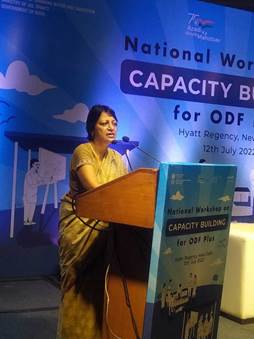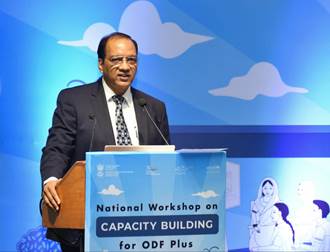To finalise the capacity building strategy and training calendar of each State and Union Territory as a part of their efforts to make their villages ODF Plus, the Department of Drinking Water and Sanitation, Ministry of Jal Shakti with the support of UNICEF organised a national workshop on capacity building in New Delhi today. Capacity building of stakeholders is key to achieving ODF Plus status and in the third year of implementation of Phase II of Swachh Bharat Mission Grameen (SBM-G), States and Union Territories have targets to ensure that all their villages become ODF Plus. More than 150 officials who are working in the sanitation section across the country participated in the programme.
Speaking at the inaugural session, Secretary-DDWS, Smt. Vini Mahajan said, “I believe we have a unique and historic opportunity to make a difference in people’s lives. The work done over the years has given us the momentum and today with strong political will at the highest level, both in the Government of India and the States, and equipped with the technical knowledge of what needs to be done for rural sanitation, we know what is to be done, how to do it. Therefore, we can actually transform our countryside.” However, we cannot do this with a government order, the Secretary added, saying that if we want to deliver rural sanitation which is a human right, and a must for human health and the dignity of people, it has to be done with the engagement, continued involvement and strong participation of local communities.
Emphasising that there are adequate funds, she said panchayat leaders at the local level should recognise the need, importance, the possibilities, and understand what option works best in their areas. Until we are willing to take on the responsibility of ensuring that the requisite actions are taken, infrastructure is developed and maintained and systems are in place, we might lose this historic opportunity, said Smt. Mahajan.

PIB
The Secretary called for the building of capacities at all levels, “The task is highly complex because we are talking about 6 lakh villages under various geographic conditions. We need strong teams that have committed people who are willing to give this issue their attention, energy, and their intellectual abilities and this must go down to the district and block level. Also, every panchayat must be brought into the loop and master trainers need to be developed at all levels and give training to the next level”.
In his opening remarks, Mr. Nicolas Osbert, WASH Chief, UNICEF outlined what is at stake for India as it fulfils its commitment to the SDG 6.2 on safely managed sanitation which is toilet usage while ensuring safe containment of human faeces through faecal sludge management and through operation and maintenance of twin pit toilets. He said that UNICEF was associated with the Mission because it contributes to the health and dignity of women and children, while preventing water borne diseases. It also provides a great opportunity to strengthen building on the gains of Phase I, he added.
On UNICEF’s support for capacity building, he said they have developed well defined training modules to empower GPs – a 5-day training module for master trainers and to date about 1232 master trainers have been developed in 12 states and engaged in ODF Plus training. UNICEF remains fully committed and accountable to help achieve the target to build capacities of sanitation workers, empower them, and raise awareness among communities.

PIB
Speaking on the occasion, Special Secretary, DDWS, Mr. Arun Baroka emphasised that solid and liquid waste management was technical in nature and given the large number of villages and lack of capacities at local level, there was a requirement for decentralised planning, implementation and operation and maintenance; in addition to sustaining behaviour change and ODF status. To address this, DDWS intends to strengthen capacity at every level in a time bound manner, equip village level functionaries with adequate information and knowledge; and sustain ODF while moving towards ODF plus. The Special Secretary also talked about the current human resources availability, the capacity building dashboard, theme wise training conducted thus far, as also the way forward.
The inaugural session was followed by presentations. States presented their action plan for capacity building during the year. This was followed by discussions on challenges and way forward and an analysis of the capacity building plans received and best practices.
During the workshop, States/UTs shared information on: Strategy for orientation of state/district level officers and number of master trainers (MTs) to be trained at state and district level along with a timeline; Strategy for engagement of MTs and their sustainability; roll out plan with cascading approach to cover all GPs/villages including a monitoring mechanism; timeline to complete all the trainings at district/block/GP/village and preparation of village sanitation plan; and appointment of resource persons to undertake capacity building initiatives at state, district and block level.
DDWS intends to provide support for the training programmes through partner training agencies. The first round of training needs to be complemented in the current financial year so that one trained resource person can be made available in all the villages; who will help prepare the Village Sanitation Plan (VSP) of the villages/GPs in the current year and monitor implementation of the same.
In July 2021, DDWS launched manuals that pertain to the key components of ODF Plus (Grey Water Management, Plastic Waste Management, Faecal Sludge Management, Biodegradable Waste Management and IEC). They provide detailed information on technologies, technical specifications of assets, estimated costs and possible O&M arrangements to support states, districts, and rural local bodies to implement solid and liquid waste management initiatives.
SOURCE-PIB